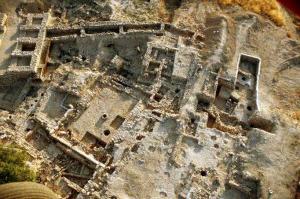
How did the nation of Israel begin? Can we trust the Bible to tell us how it really happened? Was there an Exodus from Egypt? Did Moses exist? Did a million slaves wander for 40 years in the desert? Does it matter for Christians and Jews? This post and the next will dig into these controversial historical questions.
Episode 10-1 of the Rowing with Michael Series: A journey through the Jewish/Christian Scriptures in Verse and Commentary. Introduction and Contents for this series HERE.
Michael, row the boat ashore. Alleluia….
Another Pharaoh had a heart of stone, Alleluia.
Worked God’s people to the bone. Alleluia.
He should’ve listened to Moses’ plan. Alleluia.
Ten plagues later he’s a wiser man. Alleluia.
This is the time to think critically about the Bible and real history. The Bible writers didn’t know history as we do, but that doesn’t mean there’s no history at all in the Bible. It’s especially important to examine the Exodus story for the history that it might contain because for Jews that story is the center of the Bible. It’s the story that more than any other interprets who they are and who God is. Israel begins with the miraculous work of God, pulling a bunch of slaves out of Egypt amidst signs and wonders, forming them into a nation, and leading them to the Promised Land—the Exodus.
That’s the story. But what was the Exodus really? Did it even happen? Is there a way to find out?
Archaeology and history
Historians, anthropologists, and archaeologists have gotten involved in the quest alongside Bible scholars. Many of them have no connection to any biblical faith. And why shouldn’t non-believers be interested? It’s everybody’s history. But for believers in the line of Abraham understanding this particular history is important. Judaism and Christianity are “historical” faiths. They’re not just ideas about God and what’s expected of us or something philosophy can dream up. Buddhism would get along just fine if it turned out that Buddha never existed. But Judaism and Christianity depend on real history.
Christianity and Judaism proclaim God’s actions in this world. They do so with stories that have developed over more than a thousand years in a very human way in a culture very different from ours. This makes it hard to get at the events behind the stories, but that there are such actual historical events is an important part of these two unique faiths—at least when you come to such central parts of the story as the Exodus and, for Christians, the life Jesus.
Troubled times
The region east of the Mediterranean Sea in the late 1200s BCE, when the Exodus would have occurred, was ripe for something new. The 3,500 year old Bronze Age culture had been declining slowly since about 1500 and now was falling apart. Petty kings ruled small territories and fought with each other over land. The land was nominally part of the Egyptian empire, so the kings wrote letters to Pharaoh, complaining about each other and sending bribes in return for Pharaoh’s assistance. Help never came; Egypt itself was growing weaker. Those bribes meant only that the local peasants, already burdened with the weight of a bunch of elite, immoderately wealthy leaders and bureaucrats, had to pony up even more.
Soon the letters began speaking of rebels. They called them “Hapiru,” which sounds like it could be related to the word “Hebrew,” but we don’t know that. They were probably a lot like what we call highwaymen. “Sea Peoples” also were invading. Trade, which had been rather far-ranging and efficient was deteriorating. The Hapiru and the Sea Peoples were perhaps just nails in the coffin. A once-thriving Middle Bronze Age economy with even a vibrant trade sector fell apart. Once-powerful myths that supported an authoritarian, agrarian culture no longer seemed credible. A cultural and social vacuum had to be filled.
Israel as a country did not exist, but the people who would become the Israelites must have been around somewhere. The Bible tells the story of an invasion into a “Promised Land” by escaped slaves from Egypt—hundreds of thousands or even millions wandering in the desert, fighting battles, conquering kings and laying waste to cities on the way. Miraculous plagues, miracles of food and water in the desert, God speaking from a mountaintop, tablets of stone, divine punishment when the people fell into idolatry—these things are not to be found in any archaeological findings or historical records outside the Bible. But history can say something about what did happen. People found a way to go on, to form a new community with a new story. How they may have done that is the theme of the next post, Part 2 of this episode.
Image credit: The Jewish Magazine











